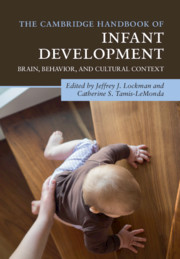Book contents
- The Cambridge Handbook of Infant Development
- The Cambridge Handbook of Infant Development
- Copyright page
- Dedication
- Contents
- Illustrations
- Contributors
- Preface
- Part I Foundations
- Part II Perceptual Development
- Part III Cognitive Development
- Part IV Action
- Part V Language
- 21 Infant Speech Perception
- 22 Infant Vocal Learning and Speech Production
- 23 Infant Word Learning and Emerging Syntax
- 24 Dual Language Exposure and Early Learning
- Part VI Emotional and Social Development
- Index
- References
24 - Dual Language Exposure and Early Learning
from Part V - Language
Published online by Cambridge University Press: 26 September 2020
- The Cambridge Handbook of Infant Development
- The Cambridge Handbook of Infant Development
- Copyright page
- Dedication
- Contents
- Illustrations
- Contributors
- Preface
- Part I Foundations
- Part II Perceptual Development
- Part III Cognitive Development
- Part IV Action
- Part V Language
- 21 Infant Speech Perception
- 22 Infant Vocal Learning and Speech Production
- 23 Infant Word Learning and Emerging Syntax
- 24 Dual Language Exposure and Early Learning
- Part VI Emotional and Social Development
- Index
- References
Summary
With close to 7,000 languages in use around the world today (Lewis, Simons, & Fennig, 2009) and only 195 countries (United Nations, 2018), being completely monolingual is quite rare as multilingualism is often the norm (Grin, 2004). Looking through the research literature, however, it would appear as though bilinguals are a unique population with distinct advantages or disadvantages from monolinguals. Spear (1984) proposed that what infants of all species learn and remember at any time in development is determined by the ecological challenges posed by their current environment and the survival value of responding successfully to them. Learning trajectories of monolingual and bilingual children are more similar than different, with differences reflecting the bilingual brain’s adaptations to the surrounding linguistic conditions. The rate and ease at which children learn language is surprising, as language acquisition is a very complex task, with infants having to quickly learn how to identify patterns within a continuous string of speech sounds (Saffran, Aslin, & Newport, 1996).
Keywords
- Type
- Chapter
- Information
- The Cambridge Handbook of Infant DevelopmentBrain, Behavior, and Cultural Context, pp. 661 - 684Publisher: Cambridge University PressPrint publication year: 2020

